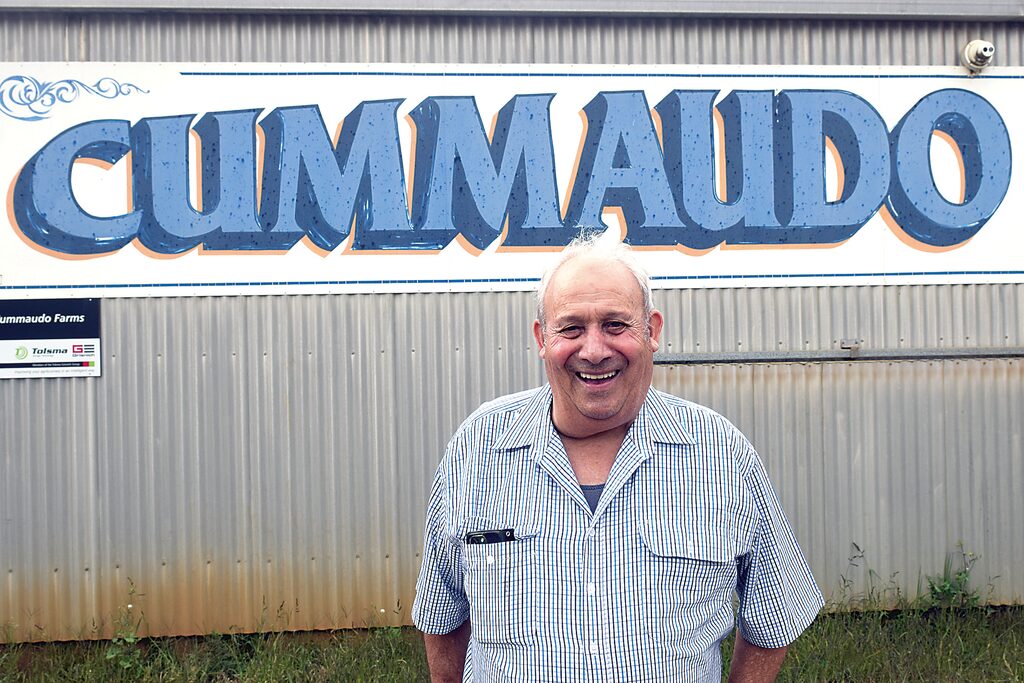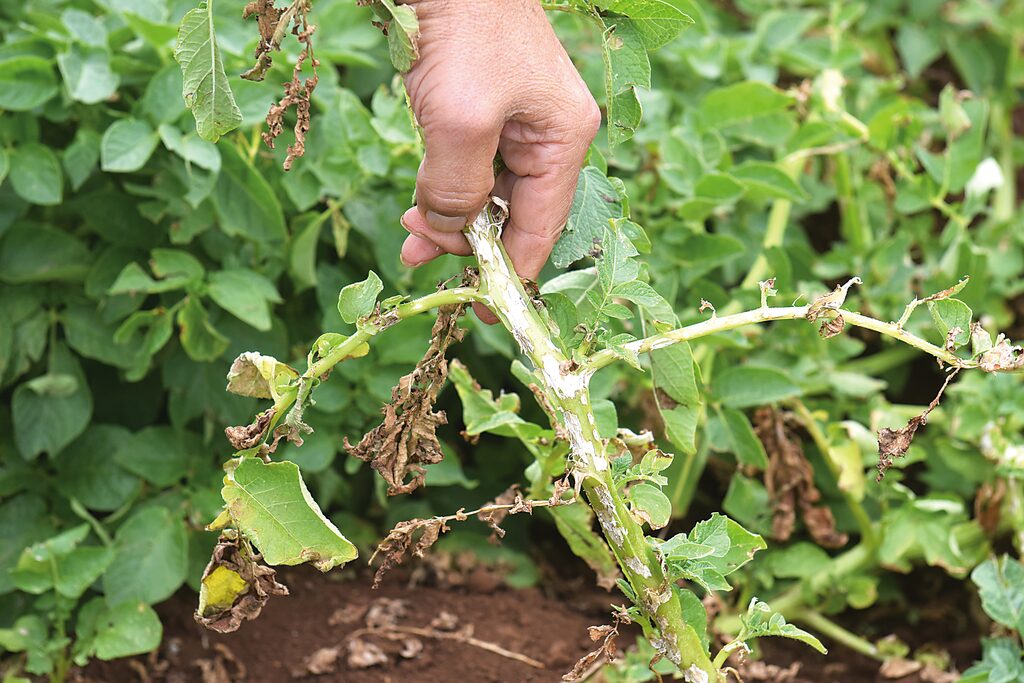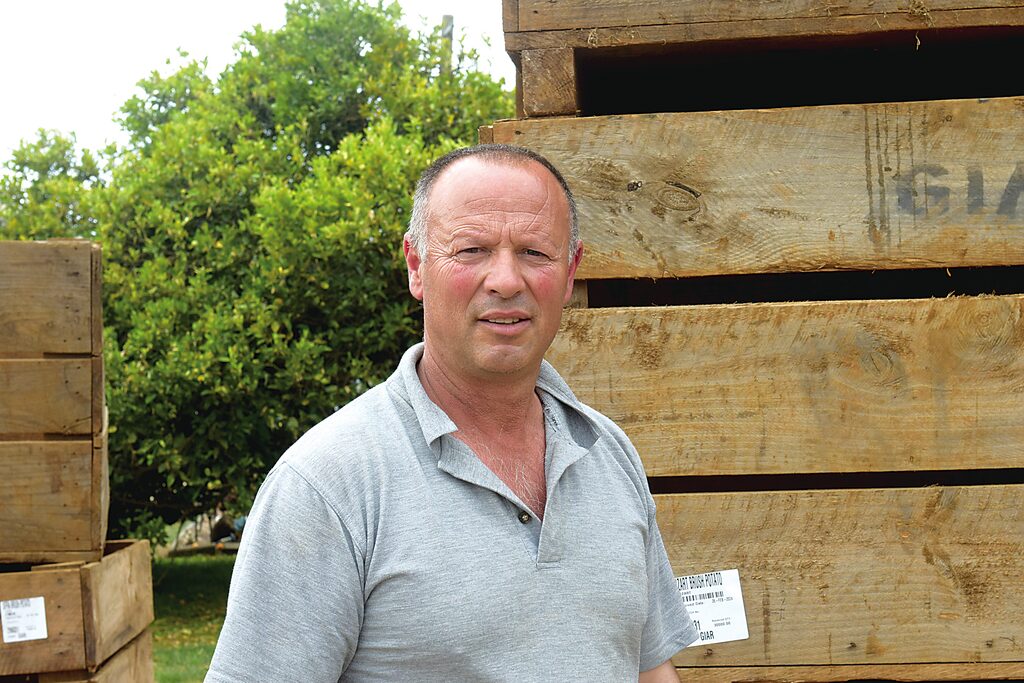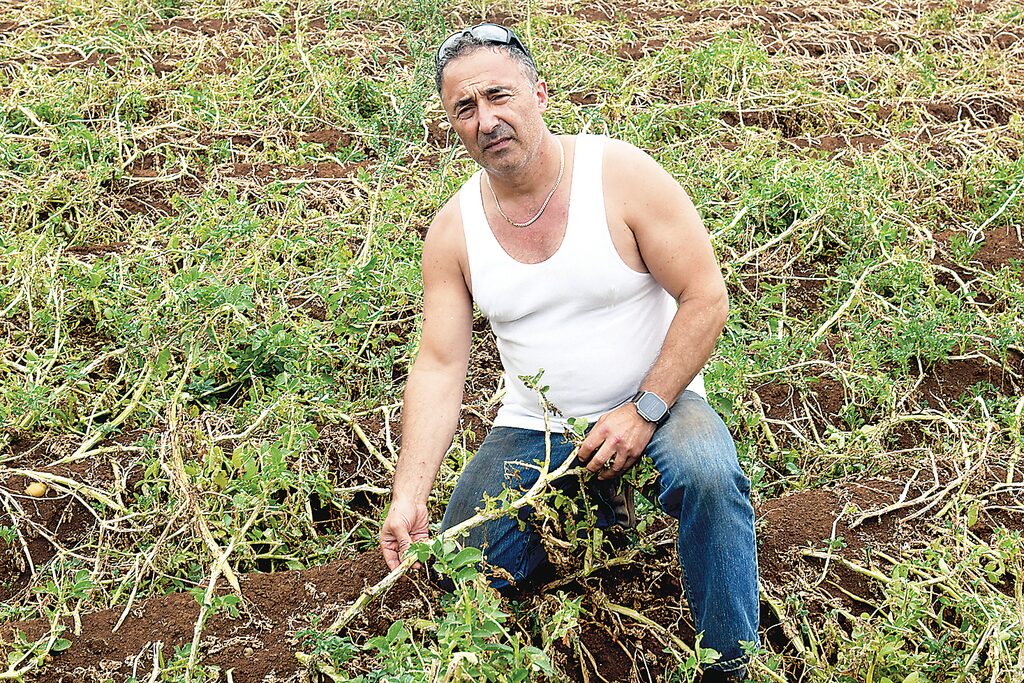By ZAIDA GLIBANOVIC
THE Cummaudo family says the storm that flattened Mirboo North on February 13 was unlike anything they’ve ever seen.
The family potato farm suffered the biggest damage they have ever experienced since it was established in 1959 by potato patriarch Tom Cummaudo.
With 30 acres of crops gone, infrastructure damage, and a home lost, the Cummaudos are doing it tough.

South Gippsland soil has been producing Victoria’s best produce, but many farmers in Mirboo North face compromised yields following the storm.
The crop on the Cummaudo farm is about 60 days old and is normally grown to around 120 days. The storm raged through town as the potatoes reached only halfway through a normal growing cycle, leaving this year’s harvest with much smaller potatoes and the owners with a huge loss.
Tony Cummaudo, second-generation farmer and managing director at the farm, said the storm had caused havoc on the family business, losing 30 acres of potatoes.
At around $500 to $600 for a tonne of potatoes and starring at a barrel of around 12 to 13-tonne loss to the acre due to undersized and damaged crop, the Cummaudos are uncertain of what this year’s harvest will look like.
The hail that came with the storm was the real culprit behind the damage – some the size of golf balls came through and laid waste to the plants. The leaves that provide energy and nutrients for the plant were severely damaged.
The team at Cummaudo Farms were on damage control immediately after the storm, as they sprayed fertiliser and a fungicide and added extra nitrogen in an attempt to get the leaves to re-shoot.
“It’s sort of like a chemo for cancer – it ain’t gonna cure it,” Tony said.
All the Cummaudos can do is sit and wait with no reassurance that the extra money, time, love and care into the crop will yield any benefits.
“We won’t know until we harvest it – we won’t know how they’ll come out like,” Tony added.
The potatoes damaged on the Cummaudo property were processing potatoes, and Tony is unsure if the processors will take the undersized potatoes as they still have to meet certain crop standards.
The crop damage was just the tip of the iceberg for Tony, as his home was left depleted after the storm.

“I was five (kilometres) away from my house on the north side of Mirboo North and I seen the storm coming in – I would’ve just thought it was a tad worse than a normal storm … nothing to worry about,” he said.
“I didn’t realise until 10 minutes later when I got a phone call saying my house roof was gone.
“When I tried going into town and there were trees down everywhere, I knew then it skyrocketed into something more severe.”
With shards of the tin roof blown 50 metres away from its original place and with insulation and wiring scattered around the property, Tony can’t begin to clean up in fear of his health with a risk of asbestos.
“I just want that security before I start touching stuff,” he said.
Though Tony’s insurer has assessed the damage and secured a temporary tarp (tarpaulin) over the house, the hail has significantly damaged the home where Tony had raised his family.
“The lounge room in particular – it just stunk … I don’t know if the TV and all that work in there because they all got wet, and we haven’t gotten power in there since,” he said.
Tony is concerned about potential mould but cannot begin clearing his family farmhouse until the roof is tested for asbestos.
Tony hasn’t had the time to worry about his home; he is now renting a place in town; his main priority is keeping the spuds going to maintain the family’s livelihood.
When speaking about how much damage he had sustained to his property, Tony said he couldn’t say, but he expects the cost to be extensive.
“You either laugh or cry – you gotta stay positive ’cause so many things can happen,” Tony said through a wry smile.
In true Mirboo North spirit, Tony faced his challenges with a sunny disposition, not willing to bend to the extent of the storm’s force.
Despite doing it tough at the moment, the Cummaudo family has leaned on each other for support.
“It’s good to get ideas from each other, support each other, bring each other up,” he said.
The storm brought down gigantic gums and pine trees over the fence line, causing significant damage to private property. Tony said he would like to see some support from the state government in terms of clearing farmland and fencing, with the cost of the storm on day-to-day farmers already insurmountable.
“You know the wish list – it would be nice to get something on my yield of potatoes, but I know that’s not going to happen,” he said.
Agriculture Victoria has been in touch with local farmers, but has not announced any type of financial support for those struggling after the disaster.
Agriculture Victoria told the Express that they have sought out local industry and networks attempting to understand the impacts of the storm.
An Agriculture Victoria spokesperson said the focus in the first week after the storm was helping farmers restore essential services and collecting information on the impacts on rural landholders.
Landholders are encouraged to report agriculture loss and damage due to the storms by using the online impact assessment form on the Agriculture Victoria website.
The Cummaudos are certainly not alone in their struggles; another local potato grower, Paul Giardina, also experienced significant crop loss.
“The storm, when it hit, it hit quite hard. We had a lot of hail and wind, and it’s damaged the shed, infrastructure, pine trees along fencing, and worse of all, the hail damage has hit 65 acres and basically wiped them out,” he said.
“The stuff that was planted at 60 days was belted; it’s green, but it was belted; it’s sort of doing nothing. The rest of the paddock, which is about 75 per cent, is whipped out; there’s nothing there, it’s just all dead.”
“Because of the wind and hail was so hard, it has exposed spuds … everything it has exposed has got holes in it.”

Mr Giardina told the Express he was frustrated with the lack of assistance from the industry, as he too, is facing a huge loss to his livelihood.
“There’s no assistance I know that’s coming our way for farmers,” he said.
“Unfortunately, we’re in a situation where I don’t think we’re getting looked at – we’re bypassed.”
“There’s not much negotiation; all I gotta do is try and salvage what we sort of can – unfortunately, the size isn’t gonna be there – these were late, late planted, so they’re gonna be on a small size. Small size is less money, which in turn is less income – so it’s tough going.”
Known to be self-sufficient and resourceful, these farmers have had no time to dwell on the past month’s events and have moved on with getting the job done.
Priding themselves on their produce, Tony and Paul have no choice but to ‘get up and get on with it’ as they would say, but things are certainly not getting any easier for local producers.
“It’s getting harder and harder and harder … the thing is you’ve got rising costs, and produce is really stable, so the last thing we need is an event like this where it actually wiped us out to a degree,” Paul said.
These farmers need to continue to pay the wages of the local workforce, and they still need to put bread on the table for themselves and their families.
Although it’s a juggling act, the two generational farmers stand tall in the face of adversity, ready to pick up the pieces and do it all again for next season.
Right now, they’re just hoping this once-in-a-hundred-year storm doesn’t come back to bite them again.
Some relief has come, as the Victorian Farmers Federation (VFF) announced last week the opening of a Disaster Relief Fund, with payments of up to $5000.
The Victorian Farmers Federation Disaster Relief Fund (VFFDRF) was established in 1994 to assist farmers who suffer loss as a result of flood or other natural disaster.
The VFFDRF Committee will oversee the collection of donations, assessment of applications, approval and distribution of individual grants to farmers up to the value of $5000 for impacts from storm or bushfire events that occurred from February 9, 2024.
Applications and donations can be accessed online at vff.org.au/vffdisasterrelieffund/ and will be open until this Sunday, March 10.












